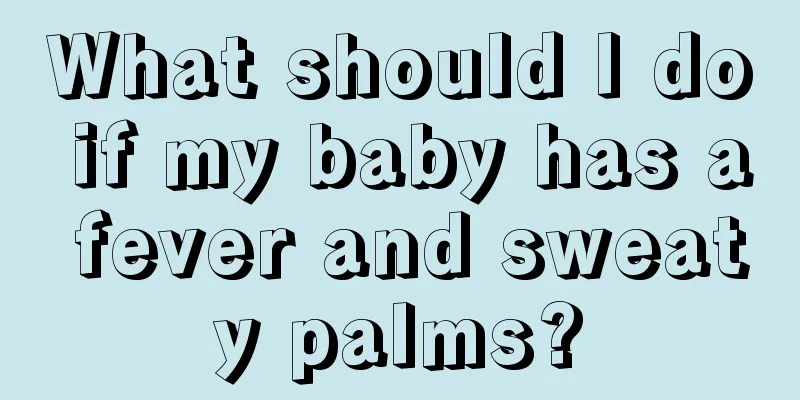What should I do if my baby has a fever and sweaty palms?

|
The baby's physical health is very susceptible to diseases such as colds, which can cause great harm to the baby and affect the baby's development and growth. Many babies will have more abnormal symptoms during a cold. For example, sweating on the palms of the baby's hands when he has a fever is a very common problem that needs to be dealt with in a timely manner. What should you do if your baby has a fever and sweating on the palms of his hands? Let's take a look at the explanation below. 1. Heat dissipation When a baby has a fever, many parents may use physical cooling methods. But in fact, many physical cooling methods are not very effective, such as cooling patches, warm water body wiping, ice compresses, etc. 2. Ambient temperature When your baby has a fever, keep the indoor temperature at a suitable level, about 26 degrees. A comfortable temperature can make your baby feel more comfortable. Don't dress your baby too much and don't let him sweat, as this will prevent the heat from dissipating. Of course, during the period of rising temperature, you should pay attention to keeping warm, especially the hands and feet. It is okay to wear one more layer, but don’t cover the baby too much. The comfort of the baby should be the priority. 3. Drink plenty of water Drink more water, this is also the sentence that doctors often tell you. This sentence is often overlooked, but I think it is the most useful sentence. Fluid intake is a necessary condition for cooling down. Drinking more water can increase the chance of urination and evaporation of skin moisture, allowing the body to dissipate heat and thus achieve the purpose of cooling down. If there is insufficient water in the body, it will be difficult to lower the body temperature even with the use of antipyretics. 4. Selection of antipyretic drugs When the body temperature exceeds 38.5 degrees, you can choose antipyretics to help reduce the temperature. 5. Recurring fever Parents who have experienced their baby having a fever may find that when the baby has a fever, after taking antipyretics, the temperature drops, but the fever will come back again after a few hours. This is actually a normal phenomenon. Moreover, because the baby's brain is not yet fully developed, the body temperature regulation center is prone to over-regulation, so the baby is prone to high fever, which may even exceed 40 degrees. Parents should not worry if the fever does not go down after taking antipyretics, and think that the drugs are ineffective. It is normal for babies to have repeated fevers, which may last for 3 days, and this is also common. |
<<: Why does my four-year-old baby have hot palms and soles?
>>: What should I do if my baby coughs and has hot palms and soles?
Recommend
How to prevent seasonal dermatitis in children?
The winter solstice is the period of recurring se...
Why does a two-year-old child cry when sleeping at night?
Children are in the stage of physical and mental ...
Children cough after tonsillitis
Children are the group most likely to suffer from...
Is it good for children to drink pure milk before bed?
Many parents pay attention to the nutritional sup...
How to prevent and care for neonatal hypoxic-ischemic encephalopathy?
Newborns are affected by many adverse factors at ...
How to treat precocious puberty?
There are many children with precocious puberty w...
Vitamin D overdose symptoms in babies
Vitamin D is an important basic nutrient for the ...
How to treat communicating hydrocele in children
Some sudden symptoms of a child's body may ca...
The reason why the baby falls and hits the ground with the back of his head
In fact, the center of gravity of babies aged one...
What is the treatment for premature infants' retinal disease?
There are always some accidents during pregnancy ...
Why are my children's teeth yellow?
When we communicate with others, the first thing ...
Do little girls have discharge?
Many parents believe that little girls’ vaginas w...
What should I do if my child has ringworm on his face? Introducing countermeasures for you
If a child has rashes on his face, parents must p...
What to do if your child has indigestion
Indigestion is a very common intestinal disease. ...
Symptoms of Candida infection in newborns
Candida infection in newborns is very harmful to ...









